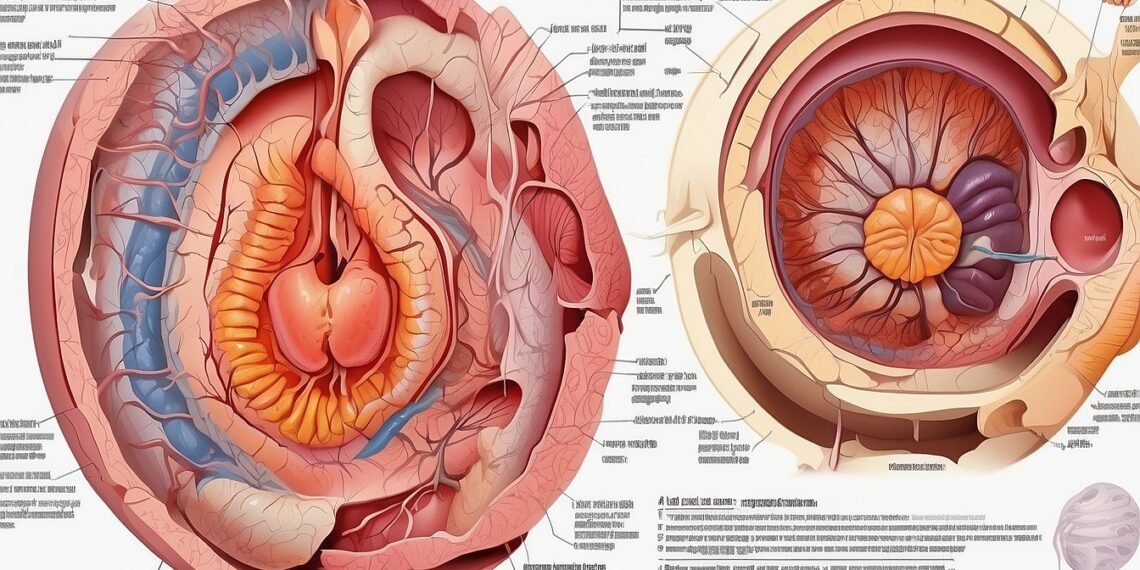Yes, stomach ulcers can cause back pain in some cases.
Direct mechanisms:
- Penetration: In severe cases, a stomach ulcer can penetrate the stomach wall and irritate adjacent nerves, leading to back pain.
- Inflammation: The inflammation caused by the ulcer can irritate the tissues surrounding the stomach, including the diaphragm and back muscles, resulting in pain.
- Acid reflux: Stomach acid from the ulcer can flow back up into the esophagus (acid reflux), causing irritation and pain that can sometimes radiate to the back.
Indirect mechanisms:
- Muscle tension: The pain from the stomach ulcer can cause muscle tension in the back, especially the upper back and shoulder blades, as the body tries to protect itself.
- Anxiety and stress: The discomfort and uncertainty associated with having a stomach ulcer can lead to anxiety and stress, which can manifest as physical symptoms like muscle tension and pain.
Treatment options:
- Medications: Medications like proton pump inhibitors (PPIs) and H2 blockers can help reduce stomach acid production and promote healing of the ulcer.
- Antibiotics: If the ulcer is caused by a bacterial infection, such as H. pylori, antibiotics will be prescribed to eliminate the bacteria.
- Diet modifications: Avoiding spicy, acidic, and fatty foods can help reduce stomach irritation and promote healing.
- Lifestyle changes: Quitting smoking and reducing alcohol consumption can also help promote healing and prevent further ulcer formation.
- Surgery: In rare cases, surgery may be necessary to remove part of the stomach or treat complications from the ulcer.
Definitions:
- Stomach ulcer: A sore or open wound on the lining of the stomach.
- Penetration: The process of an ulcer breaking through the stomach wall.
- Inflammation: The body’s response to injury or irritation, characterized by swelling, redness, and pain.
- Diaphragm: The dome-shaped muscle that separates the chest cavity from the abdomen.
- Acid reflux: The backflow of stomach acid into the esophagus.
- Muscle tension: Involuntary contraction of muscles.
- Anxiety: A feeling of worry, nervousness, or unease.
- Stress: A physical and emotional response to a demanding or threatening situation.
When to see a doctor:
It is important to see a doctor if you experience any of the following symptoms of a stomach ulcer:
- Severe back pain, especially in the upper back and shoulder blades
- Persistent stomach pain or burning sensation
- Nausea and vomiting
- Unexplained weight loss
- Loss of appetite
- Blood in the stool or black stools
- Difficulty swallowing
Additional resources:
- National Institute of Diabetes and Digestive and Kidney Diseases: https://www.nih.gov/about-nih/what-we-do/nih-almanac/national-institute-diabetes-digestive-kidney-diseases-niddk
- Mayo Clinic: https://www.mayoclinic.org/diseases-conditions/peptic-ulcer/symptoms-causes/syc-20354223
- American College of Gastroenterology: https://gi.org/
- YouTube video on stomach ulcers: https://m.youtube.com/watch?v=kopaa5dI48U
Remember: Early diagnosis and treatment of a stomach ulcer can help prevent complications and promote healing. If you suspect you may have a stomach ulcer, seek immediate medical attention.
Follow-up Questions about Stomach Ulcers and Back Pain:
Specifics of Pain:
- What type of back pain do you experience (e.g., sharp, dull ache, burning)?
- Where in your back do you feel the pain (e.g., upper back, mid-back, lower back)?
- Does the pain come and go, or is it constant?
- Does the pain radiate or spread anywhere else (e.g., shoulders, chest)?
- Does the pain worsen with specific movements or activities (e.g., eating, bending over)?
- What makes the pain feel better or worse?
Relationships:
- Does the back pain interfere with your daily activities, work, or hobbies?
- Has the back pain affected your sleep or mood?
- Have you noticed any changes in your relationships due to the back pain?
- Have you discussed your concerns about the back pain with your partner or family?
- Have you found any support groups or online communities helpful in dealing with the back pain?
Treatment and Management:
- Are you currently taking any medications for the stomach ulcer or back pain?
- Have you tried any other treatments, such as over-the-counter medications or home remedies, to manage the back pain?
- Have you been advised to make any dietary changes?
- How effective have the treatments and management strategies been in relieving your back pain?
- Are you experiencing any side effects from the medications or treatments?
Other Potential Causes:
- Have you been diagnosed with any other medical conditions that could contribute to back pain (e.g., muscle strain, arthritis)?
- Have you recently experienced any injuries or falls?
- Do you have any other symptoms besides back pain that could be related to the stomach ulcer (e.g., stomach pain, nausea, vomiting)?
- Have you discussed the possibility of other causes of the back pain with your doctor?
- Have you had any tests or imaging studies done to investigate the cause of the back pain?

